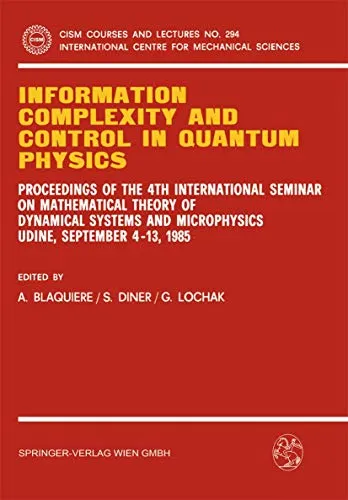
Free download скачать Information Complexity and Control in Quantum Physics: Proceedings of the 4th International Seminar on Mathematical Theory of Dynamical Systems and Microphysics Udine, September 4-13, 1985 by A. Blaquiere, S. Diner, G. Lochak
English | PDF | 1987 | 356 Pages | ISBN : 3211819924 | 27.4 MB
The proceedings have been divided into four parts:
Part I deals with Quantum information theory, Quantum probability theo- ry and Quantum symmetry. The papers appear1ng there, cover some fundamen- tal general problematics in the interpretation and use of quantum theory. The formulation of a quantum information theory is needed for a proper use of quantum optical devices for information transmission. But there are only a few presentation of such a theory in the litterature. A nice book by V.V. Mitiugov -Physical foundations of information theory, was published in russian in 1976 but never translated. It relies heavily on the work of L.B. Levitin, who has given here an extended summary of the theory. This paper provides at the same time a kind of general conceptual framework for the whole seminar.
F. Fer discusses with precise criticisms the interrelations between the basic concepts of statistical physics and information theory, with the conclusion that there is no logical proof which permits to assert that thermodynamical entropy is to be assimilated to a lack of information. I.D. Ivanovic shows how one can get the information allowing to determi- ne the state of a quantum system through a sequence of measurements.
D. Aerts has shown previously that if one considers that the probabi- listic character of classical statistical mechanics is due to a "lack of knowledge" about the state of the system, the probabilities of quantum mechanics can be explained as due to a lack of knowledge about the measu- rement. In his paper he shows why a lack of knowledge about the state of a system gives rise to a classical (Kolmogorovian) probability calculus, and why a lack of knowledge about the measurements give rise to a non classical (non Kolmogorovian) probability model.
L. Accardi studies from a mathematical point of view the fine structu- re of the states of a composite systems, showing in a sense the universa- lity of the Einstein-Podolsky-Rosen phenomenon.
The paper of G. Lochak illustrates the kind of information one can extract from the quantum mechanical formalism using geometrical -more pre- cisely symmetry- considerations. He shows that Dirac's equation admits not only one local gauge invariance, but two, and only two. The first one leads to the theory of the electron, the second one can be shown to lead to a magnetic monopole. The neutrino can be considered as a special case of this monopole.
All the papers of part I stress the fact that quantum mechanics may be considered as a mathematical system theory which is specific by its ori- ginal concept of state and where information, probability and symmetry play a central role. In fact quantum mechanics contributes to the elabo- ration of a general theory of physical systems and one can only regret that the general system theory has not yet systematically included the quantum point of view in its general framework.
One can only remark here that the definition of the concept of state leads to a reflexion on the concept of autonomy and as such on the con- cept of system. One is faced with the difficult problem of the definitior of a closed system (and the opening of this system). The privileged role played by hamiltonian systems comes from the fact that they provide an ideal model for the evolution of closed systems. The same for self-adjoir operators which play a dominant role for closed systems and reversible evolution. As a general mathematical model, quantum mechanics allows for different kind of mathematical representations. Among them are the repre· sentations using stochastic processes
[/b]
Buy Premium From My Links To Get Resumable Support,Max Speed & Support Me
AusFile
aav7s.7z.html
Rapidgator
aav7s.7z.html
TakeFile
aav7s.7z.html
Fileaxa
https://fileaxa.com/buuk52n5k00c/aav7s.7z
Fikper
aav7s.7z.html
Links are Interchangeable - Single Extraction

